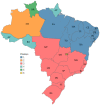An Analysis of the Deleterious Impact of the Infodemic during the COVID-19 Pandemic in Brazil: A Case Study Considering Possible Correlations with Socioeconomic Aspects of Brazilian Demography
- PMID: 35328896
- PMCID: PMC8953409
- DOI: 10.3390/ijerph19063208
An Analysis of the Deleterious Impact of the Infodemic during the COVID-19 Pandemic in Brazil: A Case Study Considering Possible Correlations with Socioeconomic Aspects of Brazilian Demography
Abstract
Due to COVID-19, a huge amount of incorrect information has been disseminated on the internet, which may interfere with the disease's advance. This study analyzes the behavior of the Brazilian population during the pandemic, employing queries of infodemic data searched on Google Trends and relating them to socioeconomic and political indicators in the country. The z-score technique was used to standardize the data; and for multivalued analysis, dendrograms and the Elbow method detected similar patterns among Brazilian states. The result was divided into three analyses. In the analysis of the research trend of infodemic terms, the themes "Prevention and Beliefs" and "Treatment" prevailed. In the exploratory analysis, socioeconomic indicators related to income and education, as well as government programs, showed no impact on infodemic searches; but the results suggest that the states that supported the Brazilian president in the 2018 election, where he obtained more than 50% of the votes, were the states that most searched for infodemic terms: a total of 46.58% more infodemic searches than in the other states. In the multivalued analysis, the socioeconomic indicators used showed similarities in the patterns, highlighting a cluster containing 77% of all Brazilian states. The study concludes that denial about the pandemic and the influence of political leadership can influence infodemic information searches, contributing to a disorganization in the control of disease control and prevention measures.
Keywords: Google Trends; clustering; dendrogram; denialism; government programs; infodemic COVID-19; socio-economic variables.
Conflict of interest statement
The authors declare no conflict of interest.
Figures








Similar articles
-
The COVID-19 infodemic in Brazil: trends in Google search data.PeerJ. 2022 Aug 4;10:e13747. doi: 10.7717/peerj.13747. eCollection 2022. PeerJ. 2022. PMID: 35945937 Free PMC article.
-
Infodemic and sources of information about COVID-19 in a Brazilian population: what are the associated factors?J Commun Healthc. 2024 Dec;17(4):337-344. doi: 10.1080/17538068.2024.2352982. Epub 2024 May 13. J Commun Healthc. 2024. PMID: 38738839
-
Global Infodemiology of COVID-19: Analysis of Google Web Searches and Instagram Hashtags.J Med Internet Res. 2020 Aug 25;22(8):e20673. doi: 10.2196/20673. J Med Internet Res. 2020. PMID: 32748790 Free PMC article.
-
A Framework of AI-Based Approaches to Improving eHealth Literacy and Combating Infodemic.Front Public Health. 2021 Nov 30;9:755808. doi: 10.3389/fpubh.2021.755808. eCollection 2021. Front Public Health. 2021. PMID: 34917575 Free PMC article. Review.
-
Covid-19 Outbreak in Brazil: Health, Social, Political, and Economic Implications.Int J Health Serv. 2022 Oct;52(4):442-454. doi: 10.1177/00207314221122658. Epub 2022 Sep 4. Int J Health Serv. 2022. PMID: 36062608 Free PMC article. Review.
References
-
- World Health Organization Coronavirus Disease (COVID-19-2019) Situation Reports–51. [(accessed on 3 October 2021)]. Available online: https://www.who.int/docs/default-source/coronaviruse/situation-reports/2....
-
- World Health Organization Munich Security Conference. [(accessed on 3 October 2021)]. Available online: https://www.who.int/director-general/speeches/detail/munich-security-con....
-
- World Health Organization COVID-19 Transmission and Protective Measures. [(accessed on 3 October 2021)]. Available online: https://www.who.int/westernpacific/emergencies/COVID-19/information/tran....
Publication types
MeSH terms
LinkOut - more resources
Full Text Sources
Medical

